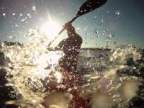- Posts: 127
- Thank you received: 10
What makes a stable paddler?
zachhandler wrote: When balance is poor, the core muscles that one uses to try to keep the boat upright are used intensively and eventually fatigue. This leads people to the conclusion that if they Just did some core strengthening in the gym, they will have better balance in the ski.
Of course time in the bucket is the biggest thing to help, but I don't agree with your basic premise. In fact it doesn't make any sense- Balance is not some innate thing outside of muscle control, strength, and conditioning.
If you have poor balance you are using the same muscles as someone who's rock solid.
The difference is that in the balanced person the connections between the brain, nervous system, and muscles are much more trained. And the muscles themselves have finer controls. In effect, they respond faster and more effectively, but they are still responding in the same way.
Lastly, Ive never heard of anyone coming to that conclusion either.
Please Log in or Create an account to join the conversation.
There is a certain amount of inherent ability however I will echo others comments that time in the seat is king. Understanding how water moves the boat, how shifts in your center effect balance, and what the limits of your ski are make all the difference.
Please Log in or Create an account to join the conversation.
- zachhandler
-

- Offline
- Platinum Member
- Posts: 785
- Thank you received: 195
Core fatigue is a symptom caused by having inadequate balace for the given boat and conditions. If balance is poor, one uses the core muscles extensively to make large and clumsy balance corrections. This is tiring. If balance is good on the other hand, one makes tiny subtle corrections to keep the boat upright. This is much less taxing on the muscles.
Balance is controlled by the brain, not the muscles. What creates balance is not strong muscles but strong connections between the appropriate neurons in the brain. The most effective way to strengthen these connections is get more time in the bucket in tippy conditions.
As a caveat, there may be problems with someone’s stroke mechanics, such as pulling back too far, that create instability. Those things need to be sorted of course. But even then, we are not training the muscles to do a better stroke as much as we are training the brain to coordinate a better stroke.
Current Skis: Nelo Vanquish AIR, Epic V10g4, NK 670 double, NK exrcize, Carbonology Feather, Think Jet, Knysna Sonic X
Former Skis: Epic v10g3, Kai Waa Vega, Epic V12 g2, Epic V12 g1, Epic v10 double, Nelo 550 g2, Fenn Elite S, Custom Kayaks Synergy
Please Log in or Create an account to join the conversation.
Let's put it like like that:
In the short run, balance by your brain is a necessary and sufficient condition to stay upright.
For a longer tour in messy conditions, strong core muscles are a necessary condition, but not sufficient.
Please Log in or Create an account to join the conversation.
zachhandler wrote: What Kwolfe said is right.
Core fatigue is a symptom caused by having inadequate balace for the given boat and conditions. If balance is poor, one uses the core muscles extensively to make large and clumsy balance corrections. This is tiring. If balance is good on the other hand, one makes tiny subtle corrections to keep the boat upright. This is much less taxing on the muscles.
Balance is controlled by the brain, not the muscles. What creates balance is not strong muscles but strong connections between the appropriate neurons in the brain. The most effective way to strengthen these connections is get more time in the bucket in tippy conditions.
.
Balance is controlled by many things, including, but not exclusive to, the brain. Facilitation, proprioception, and vestibular system.
Again, your theory doesn't seem to make any real-world sense.
A pro paddler is using his core muscles to propel the boat forward with much more energy than the novice paddler is using for balance. It's simple physics. Not to mention in anything but flat water, all paddlers are making adjustments, sometimes big ones because the ocean is pretty dynamic. Its just that the pro paddlers get it done more quickly and precisely, but that doesn't necessarily mean they are using any less energy, or certainly not to the degree that results in an immediate difference in stability from fatigue.
Balance is a combination of the facilitation of neurological pathways with tuned and conditioned muscles that leads to balance. That's the science of it. To have super balance you need both conditioned muscles and practiced nerve pathways. You don't get one without the other.
Please Log in or Create an account to join the conversation.
Not for nothing but you are comparing elite level paddlers with impeccable condition and amazing technique to the average paddler which I would suggest isn't quite fair.
I would also argue that balance has nothing at all to do with conditioning. I have see some fat out of shape people who can balance much better than exceptionally fit people. Now, to have good balance for long periods of time, yes both are needed.
Please Log in or Create an account to join the conversation.
- waterbornewarrior
-

- Offline
- Senior Member
- Posts: 42
- Thank you received: 9
jazzman wrote: what do the elites do or have that we mortals don't.
I strongly believe that balance (stability) is a passive process, not an active one. So the problem is in how most people approach it: "what can I DO to improve my stability." Practice, of course. But what you should be practicing is not over-reacting to inputs. Stop DOING so much. Conditioning helps, but it just increases your ability to over-react for longer periods of time. (It treats the symptom, not the root cause.) If you are stable in a boat, you should be able to sit in it - in flatwater, not paddling - with little more effort than sitting in a chair on land. Same heart rate, breathing, muscle activity, etc. It's a great drill to get a baseline on your stability in that boat. Then as you start paddling in flatwater you have to balance out the forces you are applying, and that's another level of skill. And then paddling in rough water is another level of skill because there are your inputs and additional external inputs.
Don
Please Log in or Create an account to join the conversation.
kwolfe wrote: Davg,
Not for nothing but you are comparing elite level paddlers with impeccable condition and amazing technique to the average paddler which I would suggest isn't quite fair.
I would also argue that balance has nothing at all to do with conditioning. I have see some fat out of shape people who can balance much better than exceptionally fit people. Now, to have good balance for long periods of time, yes both are needed.
Okey doke, we can agree to disagree
Please Log in or Create an account to join the conversation.
Latest Forum Topics
-
- In Depth Review - Kai Wa'a Vega Flex -vs- Fenn Swordfish S
- 2 days 18 hours ago
-
- Diagonal Downwind
- 6 days 1 hour ago

